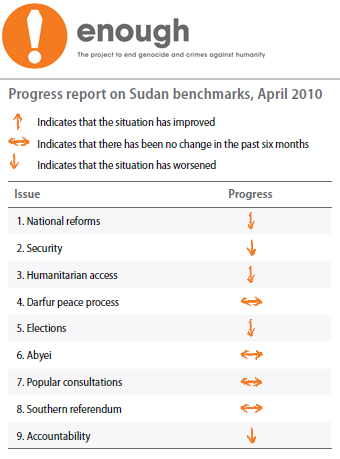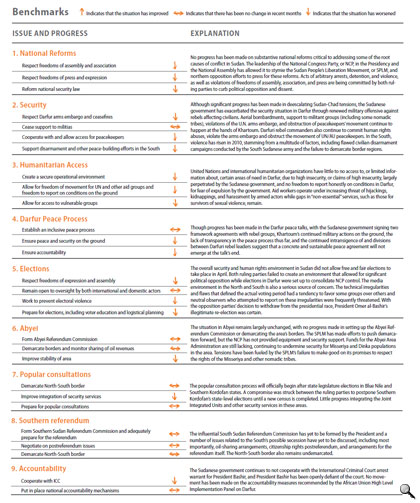
In its initial Sudan policy review, the Obama administration pledged that it would regularly evaluate the progress of peace in Sudan—or lack thereof. The administration’s approach was clear:
“Assessment of progress and decisions regarding incentives and disincentives will be based on verifiable changes in conditions on the ground. Backsliding by any party will be met with credible pressure in the form of disincentives leveraged by our government and our international partners.”
Secretary of State Clinton, October 19, 2009[1]“There will be no rewards for the status quo, no incentives without concrete and tangible progress. There will be significant consequences for parties that backslide or simply stand still. All parties will be held to account.”
Ambassador Susan E. Rice, October 19, 2009[2]
Because the administration had not publicly disclosed the precise benchmarks it is applying to assess developments, nine leading Sudan advocacy organizations co-authored the report ‘Clear Benchmarks for Sudan’ in January 2010.
Based upon the rigorous analysis of leading indicators across nine overarching categories of benchmarks, the Enough Project, the Save Darfur Coalition, and partners developed the following assessment of the amount of change or improvement that has been observed in key areas over the last six months. A more detailed examination of the factors driving each of these criteria is spelled out on the following page.

The absence of improvement during the past six months is a significant cause for concern. All parties, including the National Congress Party, the Sudan People’s Liberation Movement, rebel groups, and others, should be held accountable. As President Obama stated, “If the Government of Sudan acts to improve the situation on the ground and to advance peace, there will be incentives; if it does not, then there will be increased pressure imposed by the United States and the international community.”[3]
President Obama and Secretary Clinton must own Sudan policy far more directly, and actually implement pressures and incentives where appropriate or face growing risk that violence in Sudan will spiral out of control.
Endnotes
[1] State Department, Remarks on the Sudan Strategy, October 19, 2009. [2] Ibid. [3] The White House, Statement of President Barack Obama on Sudan Strategy, October 19, 2009.

